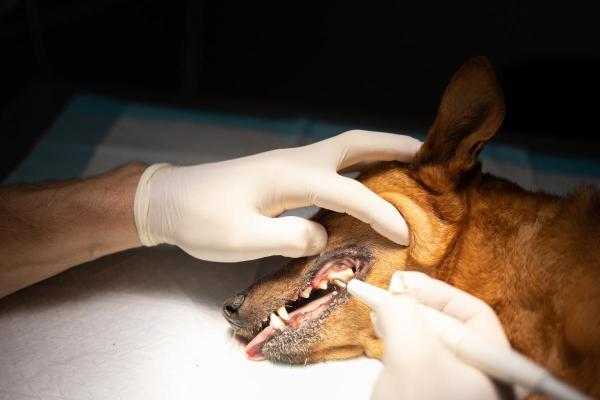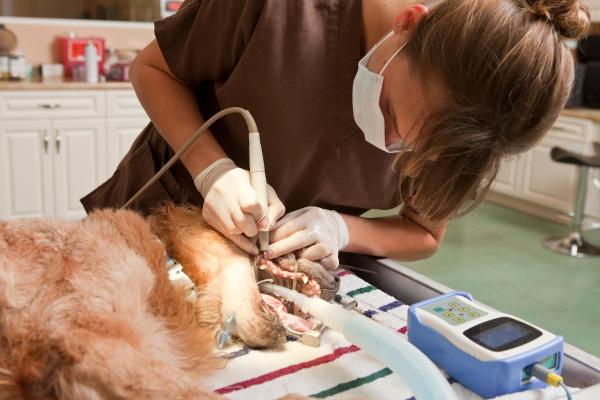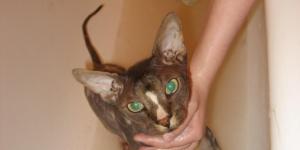Is Dog Teeth Cleaning Safe?



See files for Dogs
Dental hygiene in dogs is a serious health concern which goes ignored by too many dog guardians. Many of us neglect the cleaning of our dog's teeth, allowing plaque to accumulate and tartar to develop. This can lead to serious periodontal issues which can drastically affect the dog's oral hygiene. While poor oral health is serious enough, you may not be aware of the potentially deadly repercussions of poor dental hygiene in dogs. For this reason, teeth cleaning is becoming an increasingly common treatment for canines. However, there are some concerns over this process, leading AnimalWised to ask is dog teeth cleaning safe?
While teeth cleaning can help to avoid painful or debilitating oral health conditions, it is important to consider dog dental cleaning complications to safeguard their well-being. We even consider if it is possible a dog can die from teeth cleaning.
Is dental cleaning in dogs safe?
When we go to a dental hygienist for teeth cleaning, we know it is a routine procedure. It may be uncomfortable for the duration, but it should not cause any lasting pain or other issues. This procedure is not as straightforward for dogs. We understand that we need to remain still and endure the treatment, but dogs are not likely to assimilate this concept in the same way. The result is a need for general anesthesia.
Ultrasound devices are used to clean dog teeth clinically. Since the use of this equipment can be upsetting and uncomfortable, a fully conscious dog will likely try to escape. They will refuse the entry of the tools to their mouth and they may even become aggressive out of fear. Any head movement from the dog can also run the risk of creating damage to the teeth when using the tools, creating harm instead of promoting health.
General anesthesia allows procedures such as dental cleaning to be carried out without worrying about these issues. While it may propose risks of it is own, it is considered a much safer alternative than performing the procedure while the dog is conscious.
Although generally safe, there are possible complications which can occur during dog teeth cleaning. Some of these are related to the general anesthetic, but others are risks which can occur as a result of the procedure itself. These dental cleaning complications in dogs include:
- Aspiration of water into the airways: can lead to aspiration pneumonia and other respiratory problems. This can also happen if fasting hours are not respected and the animal vomits when under anesthetic.
- Excessive bleeding: the mechanical action of the tools against the gums can result in bleeding.
- Broken tooth: will only occur if the tooth is previously damaged or the procedure is carried out incorrectly, otherwise the ultrasound device should not cause harm.
- Pre-existing conditions: the teeth cleaning procedure under anesthetic can result in exacerbation of pre-existing cardiac, blood pressure or other health disorders. Discover more with our article on pulmonary hypertension in dogs.
- Nausea and vomiting: side effects which can result in aspiration.
- Organ failure: if the anesthesia time is prolonged (normally it does not exceed one hour, but it can increase if the cleaning is done at the same time as another intervention such as sterilization), complications such as acute renal failure may occur.
- Allergic reaction: in rare cases, an allergic reaction to the drugs used in anesthesia may occur.
- Malpractice: while very rare and reduced when using an experienced veterinary oral surgeon, dog teeth cleaning complications can sometimes be attributed to the inexperience or poor work of the professional in charge of cleaning.
As always when subjecting a dog to an intervention with general anesthesia, it is essential that we put ourselves in the hands of trusted professionals. This helps to minimize problems and provide confidence. While a generally safe procedure, we need to be aware that any procedure comes with certain risks. This risks should always be less than the advantages of the procedure in question. If a veterinarian consideres the risk to be too great, the dental cleaning should not be carried out.
Discover why your dog may have rotten teeth with our relates guide to canine periodontitis.

Can a dog die from dental cleaning?
It is possible a dog can die during dental cleaning. This is not likely to be a result of the procedure itself, but due to the complications we have explained above. These can be in combination. While it is unlikely, a dog dying during a dental cleaning is most commonly due to the following:
- Severe allergic reaction to anesthesia
- Depression of the cardiorespiratory system
- Acute renal failure
It is important to know that these situations may be reversed as soon as they are diagnosed, preventing a fatal outcome that. As we have said, this will occur in a very small minority of cases. The better the veterinarian and the resources of the clinic, the greater the chances of success.
When to clean your dog's teeth
Ultrasonic dental cleaning is recommended for the following cases:
- Dogs with excessive tartar buildup: can lead to periodontal diseases that cause a lot of pain by inflaming the gums. They may suffer from bad breath, bleeding, problems eating and other issues. Learn more about the reasons for gum bleeding in dogs with our related article.
- Dogs with a tendency to develop tartar: this is because not everything can be removed by manual cleaning with a toothbrush. In these cases, a yearly clinical cleaning is recommended.
Since these cleanings are carried out under general anesthesia, the dog must be fit in order to undergo the procedure. As with any other intervention under anesthesia, the veterinarian will have to carry out some prior tests to confirm their health status. These will likely include a blood test and an electrocardiogram.
If the results are good and it is believed the dog can metabolize the anesthetic drugs well, they will be a candidate for a dental cleaning. Cleaning will not be recommended for dogs with serious heart, kidney, respiratory or other disorders. They will be at greater risk when administering anesthesia. In any case, it will be up to the veterinarian to examine the tests and decide if dental cleaning is feasible because the advantages outweigh the risks.
Learn about the different ways of cleaning a dog's teeth with our related article.

How many dogs die from teeth cleaning?
There is no centralized database used to track the deaths of dogs during or as a result of dental cleaning. We do know that dog deaths due to this procedure are very low. A paper from 2015 provided a case where a dog died as a result of secondary bacterial infection during a dental scaling procedure[1]. The authors of this paper claimed this was the first death according to their knowledge of a dog dying by the particular pathogen during this procedure.
Dental cleaning is a very routine procedure for dogs. Instances of complications are in themselves rare, with mortality during this procedure statistically very unlikely. This is especially since the veterinarian will make the appropriate checks to determine if complications are likely.
Dog tooth cleaning and scaling can also help with issues such as halitosis. Learn more with our article on the causes and treatment of bad breath in dogs.
If you want to read similar articles to Is Dog Teeth Cleaning Safe?, we recommend you visit our Basic care category.
1. Franci, P., Dotto, G., Cattai, A., & Pasotto, D. (2015). Lethal septic shock after dental scaling in a healthy dog due to Ochrobactrum anthropi-contaminated propofol. The Journal of small animal practice, 56(5), 345–347.
https://doi.org/10.1111/jsap.12284







